Global Language Education Office

I sometimes wonder if people still believe in free speech. It is often attacked these days as an unnecessary concession to political adversaries when one has power over them. Or such freedom is cynically defended when one is out of power. On the positive importance of free speech, I can do no better than borrow John Milton’s earnest defense of the preconditions to free expression in his essay Areopagitica, which presupposes a morally ‘fallen’ world in which good and evil are mixed and must be unmixed through experiencing both:
It was from out the rinde of one apple tasted, that the knowledge of good and evill as two twins cleaving together leapt forth into the World. And perhaps this is that doom which Adam fell into of knowing good and evill, that is to say of knowing good by evill. As therefore the state of man now is; what wisdome can there be to choose, what continence to forbeare without the knowledge of evill? He that can apprehend and consider vice with all her baits and seeming pleasures, and yet abstain, and yet distinguish, and yet prefer that which is truly better, he is the true wayfaring Christian. I cannot praise a fugitive and cloister’d vertue, unexercis’d & unbreath’d, that never sallies out and sees her adversary, but slinks out of the race, where that immortall garland is to be run for, not without dust and heat. Assuredly we bring not innocence into the world, we bring impurity much rather: that which purifies us is triall, and triall is by what is contrary. That vertue therefore which is but a youngling in the contemplation of evill, and knows not the utmost that vice promises to her followers, and rejects it, is but a blank vertue, not a pure one.
Perhaps this Early Modern English passage requires ‘translation’ into Modern English:
It was from out of the skin of one apple tasted that the knowledge of good and evil as twins clinging together leapt forth into the world. And perhaps this is that judgment that Adam fell into of knowing good and evil, that is to say, of knowing good by evil. The state of humankind is now this: what wisdom can there be to choose, what restraint to maintain, without the knowledge of evil? He who can apprehend and consider vice with all her baits and seeming pleasures, and yet abstain, and yet distinguish, and yet prefer that which is truly better, that one is the true wayfaring Christian. I cannot praise a fugitive and cloistered virtue, unexercised and unbreathed, that never sallies forth to face her adversary, but slinks out of the hot, dusty race for which that immortal garland is run. Certainly, we bring not innocence into the world; rather, we bring much impurity. That which purifies us is trial, and trial is by what is contrary. The virtue that is therefore a mere youth in contemplating evil, and does not know the utmost that vice promises her followers, and rejects it, is only a blank virtue, not a pure virtue.
Milton borrows heavily from the Genesis temptation story to describe our existential circumstances in a post-Genesis world, where we come to know good by knowing evil. And this, says Milton, is our judgment. We judge and are judged by means of the same judgment: our own. Without freedom, we would be mere mechanisms. We ourselves do not esteem forced obedience: neither does God. Providence therefore left mankind free. Or so thinks Milton, and he has been very influential on this point.
If mankind has free will, but nobody has a monopoly on truth – and Milton affirms these – then one can reasonably infer that we should be free to act in accordance with political freedom: namely, to speak freely. Do we have this right? That is a topic for another essay.

